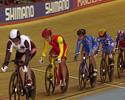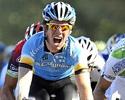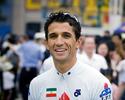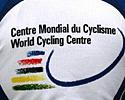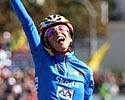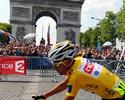
Recently on Cyclingnews.com |
Olympic Cycling News and Round-up, July 29, 2008Edited by Greg Johnson UCI rejects keirin cash claims
The International Cycling Union (UCI) has formally rejected claims by a BBC report it accepted £1.5 million in return for keirin's introduction as an Olympic Games sport. The British media outlet claimed that the international federation received the payments from Japanese keirin organizers two months after it announced keirin would debut at the 2000 Olympic Games in Sydney, Australia. When confronted with the allegations, former UCI president Hein Verbruggen said the costs covered by the Japanese were related to the sport's promotion and development. Verbruggen, who now works for the International Olympic Committee, said that there was total transparency in the UCI's dealings with the Japanese. "UCI looked into this matter when questions were first raised by the BBC in early June," said the UCI in a release. "A thorough examination of our records and interviews with those involved has turned up no evidence that this was anything other than a straightforward, completely proper arrangement to promote track cycling. "As UCI exists to promote cycling, it is perfectly logical that UCI would cooperate with Japanese national cycling groups to encourage international interest in track cycling," continued the release. "The agreement did not include any provision regarding keirin's acceptance as an Olympic sport or even a commitment by UCI to seek its inclusion in the Olympic programme. To conclude otherwise would be incorrect." The report came after the BBC was given a document showing flights for Verbruggen that had been paid for by the Japanese keirin association. A top Japanese cycling official identified only as Mr Koramasu confirmed that no deal was done with the UCI for keirin's Olympic inclusion. Koramasu confirmed that there had never been an additional direct payment of cash to the UCI. He said they had supported the sport's development by building training centers in Japan and the only cash payment he was aware of to the UCI was its membership fee - paid by all member nations. The UCI pointed out that the timeline between its revival of track racing promotion plans and the discipline's inclusion in the Olympic Games didn't fit. It also aid all expenses related to its track promotion agreement were reviewed by an independent auditor and deemed proper. "In fact, the agreement was signed six months after keirin was entered in the programme, along with three other track cycling events - the men's Olympic sprint and Madison, and the women's 500-meter time trial," said the UCI. "The agreement produced clear benefits for all track cycling disciplines as evidenced by the superb progression of track cycling over the past 10 years. "It allowed UCI to hire a full-time track cycling coordinator, support track cycling events around the world and contributed to the establishment of a world cycling center, including a velodrome in Switzerland," it continued. "Through UCI's efforts, track cycling was rejuvenated in the mid-1990s." Geraint or Cav? British Cycling's Olympic dilemmaBy Mark Appleton, BikeRadar.com
If the British Cycling team is raring to get to Beijing and go racing, there are still a few last minute selection details which remain to be ironed out. The most notable of these is the question over who, if anyone, will contest the Men's Individual Pursuit event along with Britain's reigning Olympic champion Bradley Wiggins. The two riders in contention are Welsh Barloworld rider Geraint Thomas and the Isle of Man's quadruple Tour de France stage winner Mark Cavendish of Team Columbia. The selection dilemma is closely related to the proximity, time-wise, of the Individual and Team Pursuit events, with the first round of the latter beginning the morning after the final of the solo event. Thomas, like Wiggins, is a member of the five man pursuit squad (only four ride) and the effect of his possible participation in the individual event is a cause for concern for team management. For the Manxman, however, this factor does not come into play and the indications are that if he can produce decent enough times in trials over the next few weeks, he will get the nod. Performance Manager and head coach Shane Sutton said: "We're waiting on the trials of Mark Cavendish in Manchester and also in Beijing. Than we'll decide on which athlete will take that spot." With Wiggins seen as the favourite to retain his individual Olympic title, a second medal in this discipline would we a bonus but clearly isn't the priority. "At the moment our goal, first and foremost, is gold in the team pursuit and we don't want to jeopardize that by running the IP with Geraint," continued Sutton. "So we'll wait and see what Mark comes up with." Iran may surprise at the OlympicsBy Paul Verkuylen
Iran could be a surprise package at the Olympic Games road race in Beijing, China after a strong showing at the recent Tour of Qinghai Lake. The Tabriz Petrochemical Team was easily the strongest team in the mountains, taking the first three places in the mountains classification. The Olympic road race course is one of the hilliest ever seen at an Olympic Games and with the confidence gained in Qinghai, Iran shouldn't be allowed too much room to move. Iran has qualified three accomplished climbers for the race Ghader Mizbani Iranagh, Hossein Askari and Mehdi Sohrabi. Rohani Ahad Poorfarajolah, general manager of the Tabriz Petrochemical Team, is playing down the chances of a strong result for the squad. "Tours are completely different than road races," he said. "There is more competition and tighter competition. It is difficult to predict if our riders will achieve a good result. But we will try." Askari is likely to lead the squad after finishing third in Qinghai and taking out the best Asian rider classification. "We will ride to take the best result for an Asian rider in Beijing," he said. "The course has a bit of a mountain, so I think that we will be able to ride in a good position." It will be the first time that all three riders compete in the Olympic Games. Shuang buoyed by Swiss training
China's Guo Shuang is hopeful of a strong Olympic campaign at her home Games next month after returning from training in Switzerland. The track cyclist spent time training at the International Cycling Union's (UCI) own velodrome at its headquarters in Switzerland. "I am still a little bit tired, but in a good spirit. Training in the UCI center gave me more confidence for the Olympics," Shuang told News.cn. "In Switzerland, I followed my coach's new strategies for Olympics, I had tried my best to regain more energy during the past two month. I still need to practise some before the Olympics." Shuang is China's hope for gold in the women's Olympic sprint race. She collected gold at the 2006 Asia Games as well as taking bronze in both the sprint and keirin at the World Championships in 2006, and two silver medals in sprint and keirin at the World Championships in 2007 The 22 year-old spent time preparing in Switzerland after missing out on the podium at this year's Track World Championships in Manchester, England. Shuang has been training under Daniel Morelon, a former French Olympian, and hopes the hard work will pay off in August. The Chinese Cycling Association's (CCA) Jiang Guofeng said the organization is trying not to put too much pressure on the youngster. Shuang's biggest challenge at the upcoming Games will come from a super-strong British squad including Victoria Pendeton and Rebecca Romero. "We do not want to put much pressure on Guo even we have high expectations on women's sprint," said Jiang. "I hope she can forget the unhappiness of the Manchester world championship and concentrate on the preparation for the Olympic." Positive sees Danes drop AndersenPeter Riis Andersen won't contest this year's Olympic Games in Beijing, China after the Dane failed an anti-doping test. Danish sporting federation DIF announced on Monday the 28 year-old wouldn't contest the cross-country mountain biking event following the test results. Andersen, Denmark's cross country mountain bike champion, failed both the A and B sample tests. The Dane was found to have banned blood booster EPO (erythroipoietin) in his system. Andersen admitted during a press conference that he had "taken six EPO pills" to ensure he made the Olympic squad. "My performance this spring was not up to an Olympic level and I was afraid of not making the team," he said. Of the 163 anti-doping tests carried out by Denmark's anti-doping committee on its Olympic athletes, Andersen's is the only positive today. DIF has expelled Andersen, who riders for German Team ALB-GOLD, him from the Olympic squad. Bastianelli's Olympics campaign in jeopardyWorld champion records non-negative anti-doping test
Current Women's Road World Champion Marta Bastianelli has returned a non-negative test result for a banned substance. The 21 year-old has tested positive for the dietary aid flenfluramine, during a routine doping control at the European championships held in Italy in June. The Italian cycling federation's Renato Di Rocco was astounded by the news. Di Rocco voiced concern for the athlete's health following the non-negative sample. "She has been incredibly naive," Di Rocco told Sporza. "Marta is really obsessed with her weight. She eats only salads. If a test of Bastianelli's B-sample upholds the results of her first sample, the rider could be axed from Italy's Olympic Games roster. The Olympic Games commence in Beijing, China in just 10 days time. "We will now also test the B-sample," he added. "If that is also positive then Marta has a problem. Not only in regard to her participation at the Olympic Games but also her image and that of cycling." Bastianelli's mother, Mirella, defended her saying the cyclist was incredibly careful that any medication she consumed complied with World Anti-Doping Agency rules. "My daughter only took a medicine for losing weight, Benfluorex, with the agreement of her doctor; she made sure that it wasn't a banned substance, it had a pineapple base," Mirella Bastianelli told AFP. "Marta was so careful that recently she refused an anesthetic at the dentist for fear that it might contain a banned substance," she added. Bastianelli claimed the World Road Championship last September in Stuttgart, Germany. In 2004 she was second in the Junior World Championships road race in Verona, Italy. Bastianelli is not the first female world champion to suffer from weight issues. In 1994 Dutch cyclist Leontien van Moorsel dropped out of the sport suffering from anorexia nervosa. She returned to the sport in 1998, winning the time trial and finished second in the road race at the World Championships that year. Olympic village opens amidst doping, pollution concernsThe Olympic village in Beijing opened its doors to hundreds of athletes on Sunday, ahead of the Games which begin on August 8, with the Chinese delegation being the first team to check in to the athlete's compound. But with the build up to the Games gathering steam, concerns about the continued problem of doping as well as poor air quality hang over the Olympic village. International Olympic Committee president Jacques Rogge, interviewed in the Belgian newspaper De Standaard, said he expected 40 athletes to be caught doping during the Beijing Games. Rogge based his statements on increased doping controls, when compared with previous Olympic Games. At the Sydney Games in 2000, there were 12 positives from 2,500 tests. This year, there will be 4,500 controls performed at the Olympic Games. As athletes arrive, concerns have been raised about air pollution in the Chinese capital, which worsened despite efforts from the government to order cars off the streets. It has spent some $17 billion to relocate coal-fired power plants and steel mills and other measures to control air quality, but smog still remains a problem. While gases such as carbon monoxide and nitrous dioxide have been reduces, the fine particulate matter in the air remains, and can cause problems for the lungs of endurance athletes such as cyclists. Rogge said last year that some endurance events may be delayed if the air quality is poor. For the past three days, the air index in Beijing has been above 100, or "unhealthy for sensitive groups" such as children and the elderly - a common level of pollution in many large urban centers like Los Angeles. The first cycling event will be the men's road race on August 9. Sastre added to Spanish Olympics squad
Carlos Sastre (CSC-Saxo Bank) has been added to the Spanish Olympic cycling team, the Spanish cycling federation announced Friday. National selector Paco Antequera, finalised the team for the Beijing Games road race. Sastre will join Alejandro Valverde (Caisse d'Epargne), Oscar Freire (Rabobank), Samuel Sanchez (Euskaltel-Euskadi) and Alberto Contador (Astana), the winner of this year's Giro d'Italia and the 2007 Tour de France. Sastre takes the place of Oscar Pereiro, who crashed out of the Tour on stage 15 and had to undergo surgery for a broken arm. For the time trial, Spain will be represented by Sanchez and Contador. Quick Step's Carlos Barredo was named as a reserve to replace Freire, Valverde or Sastre, while Caisse d'Epargne's Ivan Gutierrez would stand in for Sanchez or Contador. (All rights reserved/Copyright Future Publishing (Overseas) Limited 2008) |

